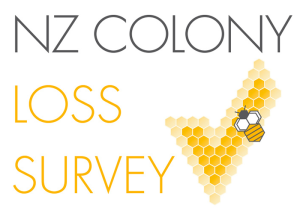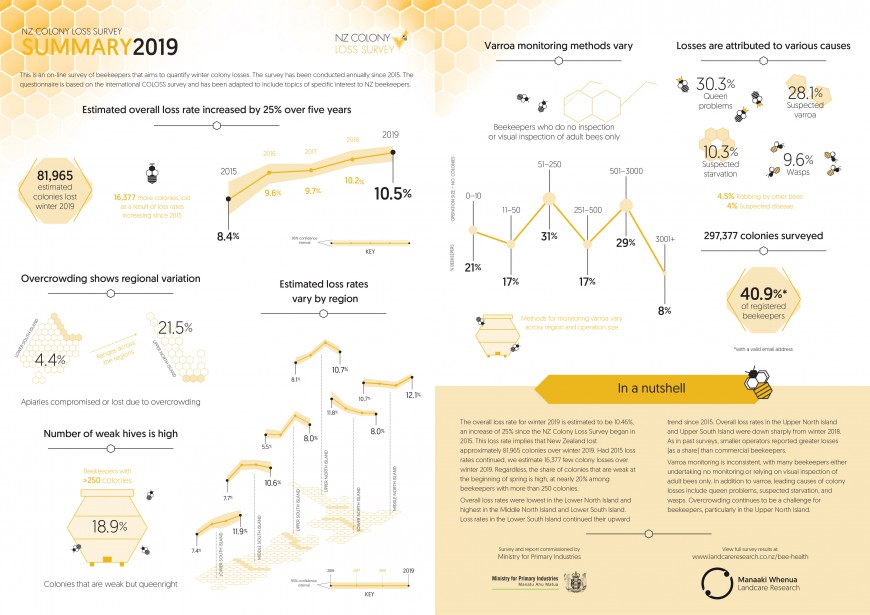2019 Colony Loss Survey
Back a level
In this section
Conducted annually since 2015, the New Zealand Colony Loss Survey is based on the survey of beekeepers developed by the international COLOSS honey bee research association.
 Survey topics include the number and nature of over-winter colony losses, queen health and performance, indicators of diseases and parasites, treatment of Varroa, supplemental feeding, and colony management. Because the challenges facing New Zealand beekeepers differ from those facing beekeepers in the northern hemisphere, the survey also includes questions that are specific to to the New Zealand context, e.g. apiary crowding, predation by wasps, and nectar flow from native trees.
Survey topics include the number and nature of over-winter colony losses, queen health and performance, indicators of diseases and parasites, treatment of Varroa, supplemental feeding, and colony management. Because the challenges facing New Zealand beekeepers differ from those facing beekeepers in the northern hemisphere, the survey also includes questions that are specific to to the New Zealand context, e.g. apiary crowding, predation by wasps, and nectar flow from native trees.
For the purpose of completing the survey, winter is defined as the period between 1 June and the time the beekeepers open their hives for the first spring round.
In a nutshell
- The overall loss rate for winter 2019 is estimated to be 10.46%, an increase of 25% since the NZ Colony Loss Survey began in 2015. This loss rate implies that New Zealand lost approximately 81,965 colonies over winter 2019. Had 2015 loss rates continued, we estimate 16,377 few colony losses over winter 2019. Regardless, the share of colonies that are weak at the beginning of spring is high, at nearly 20% among beekeepers with more than 250 colonies.
- Overall loss rates were lowest in the Lower North Island and highest in the Middle North Island and Lower South Island. Loss rates in the Lower South Island continued their upward
trend since 2015. Overall loss rates in the Upper North Island and Upper South Island were down sharply from winter 2018. - As in past surveys, smaller operators reported greater losses (as a share) than commercial beekeepers.
- Varroa monitoring is inconsistent, with many beekeepers either undertaking no monitoring or relying on visual inspection of adult bees only. In addition to varroa, leading causes of colony losses include queen problems, suspected starvation, and wasps. Overcrowding continues to be a challenge for beekeepers, particularly in the Upper North Island.
2019 winter losses
![Colony losses (overall): Estimated total colony losses by region [95% confidence interval] Image](/assets/Discover-Our-Research/Environment/Society-culture-policy/NZ-Colony-Loss/2019-Survey/2019-winter-losses/Colony-losses-overall/thumb650w-3__FitMaxWzE1LDE1XQ.png)





![Colony losses (beekeeper averages): Estimated share of colonies lost to various causes (by region) [95% confidence interval] Image](/assets/Discover-Our-Research/Environment/Society-culture-policy/NZ-Colony-Loss/2019-Survey/2019-winter-losses/Colony-losses-beekeeper-averages/thumb650w-4__FitMaxWzE1LDE1XQ.png)
![Colony losses (beekeeper averages): Estimated share of colonies lost to various causes (by operation size) [95% confidence interval] Image](/assets/Discover-Our-Research/Environment/Society-culture-policy/NZ-Colony-Loss/2019-Survey/2019-winter-losses/Colony-losses-beekeeper-averages/thumb650w-5__FitMaxWzE1LDE1XQ.png)






2018-2019 season





















![Competition for apiary sites: Lost or compromised apiaries (by region) [95% confidence interval] Image](/assets/Discover-Our-Research/Environment/Society-culture-policy/NZ-Colony-Loss/2019-Survey/2018-2019-season/thumb650w-2-v4__FitMaxWzE1LDE1XQ.png)
![Competition for apiary sites: Lost or compromised apiaries (by operation size) [95% confidence interval] Image](/assets/Discover-Our-Research/Environment/Society-culture-policy/NZ-Colony-Loss/2019-Survey/2018-2019-season/thumb650w-v9__FitMaxWzE1LDE1XQ.png)






